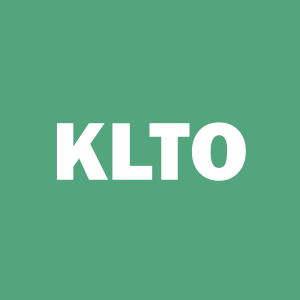Klotho Neurosciences Moves Forward with Manufacturing Gene Therapy for the Treatment of ALS
Rhea-AI Summary
Klotho Neurosciences (NASDAQ: KLTO) announced advancement in manufacturing and process development for KLTO-202, its investigational gene therapy treatment for amyotrophic lateral sclerosis (ALS). The company has licensed a unique RNA splice variant of the human alpha-Klotho gene from the Autonomous University of Barcelona for developing advanced gene therapies.
The company's research has demonstrated that overexpression of secreted alpha-Klotho (s-KL) using gene therapy has shown positive therapeutic outcomes in multiple animal studies, including mouse and non-human primate models. The timeline for development indicates approximately 8 months for manufacturing and 4-6 months for regulatory processes, with Phase I/II clinical trials expected to begin by Q3 2026.
KLTO plans to collaborate with contract research organizations (CROs) to manage manufacturing and clinical trials, maintaining operational efficiency without significant staff expansion. The company aims to use an AAV vector to deliver the s-KL gene directly to motor neurons affected by ALS, a disease that typically leads to paralysis and death within 2-3 years of diagnosis.
Positive
- None.
Negative
- Extended timeline to clinical trials (approximately 12-14 months)
- Complex manufacturing process requiring significant development time
- Multiple regulatory steps needed before trial initiation
News Market Reaction
On the day this news was published, KLTO gained 56.92%, reflecting a significant positive market reaction.
Data tracked by StockTitan Argus on the day of publication.
A unique RNA splice variant of the human gene called alpha-Klotho has been licensed by the Company from the Autonomous University of
The Company expects that it will take approximately eight months to complete process development and manufacturing of KLTO-202, and about four to six months to conduct meetings with FDA, complete all FDA-mandated animal safety studies, file an investigational new drug application (IND), train and prepare clinical sites where the Phase I/II studies can be conducted, and then begin the single-dose gene therapy studies in ALS patients by the third quarter of next year. The Company will work with contract research organizations (CROs) to facilitate all activities including manufacturing and clinical trials without the need to hire several dozen staff members, which would significantly increase our operating overhead.
Dr. Joseph Sinkule, the Company's CEO and founder commented: "With our recent fundraising success, we're moving forward with manufacturing the s-KL transgene DNA for KLTO-202. We've identified a more efficient method of producing the AAV vector to deliver the s-KL gene directly to motor neurons—the cells most affected by ALS. Our goal is to increase local s-KL protein levels to protect these neurons from the damage that leads to voluntary and involuntary muscle paralysis and ultimately death."
ALS typically progresses rapidly, with most patients losing mobility, respiratory function, and life within just 2–3 years of diagnosis.
About Klotho Neurosciences, Inc. Klotho Neurosciences, Inc. (NASDAQ: KLTO), is a biogenetics company focused on the development of innovative, disease-modifying cell and gene therapies using a protein derived from a patented form of the "anti-aging" human Klotho gene (s-KL), and its novel delivery systems to transform and improve the treatment of neurodegenerative and age-related disorders such as ALS, Alzheimer's, and Parkinson's disease. The Company's current portfolio consists of its proprietary cell and gene therapy programs using DNA and RNA as therapeutics and genomics-based diagnostic assays. The Company is managed by a team of individuals and advisors who are highly experienced in biopharmaceutical product development and commercialization.
Investor Contact and Corporate Communications - Jeffrey LeBlanc, CFO
ir@klothoneuro.com
Website: www.klothoneuro.com
Forward-Looking Statements:
This press release contains forward-looking statements. These statements are made under the "safe harbor" provisions of the
![]() View original content to download multimedia:https://www.prnewswire.com/news-releases/klotho-neurosciences-moves-forward-with-manufacturing-gene-therapy-for-the-treatment-of-als-302494100.html
View original content to download multimedia:https://www.prnewswire.com/news-releases/klotho-neurosciences-moves-forward-with-manufacturing-gene-therapy-for-the-treatment-of-als-302494100.html
SOURCE Klotho Neurosciences, Inc.










